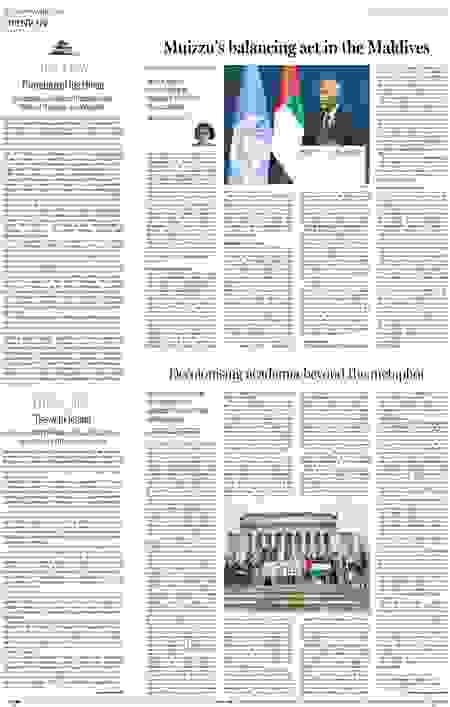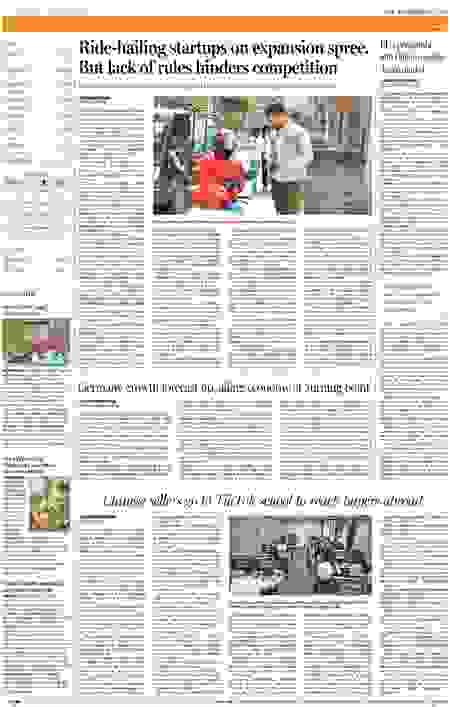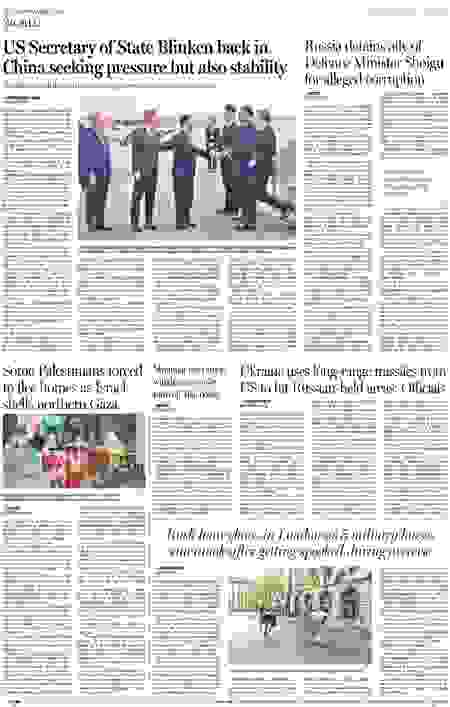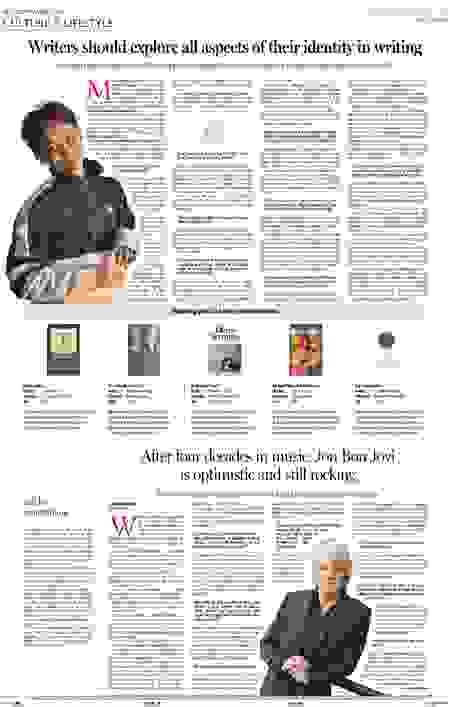OPINION
Muizzu’s balancing act in the Maldives
Several powers are contesting for influence in the Indian Ocean countries.
- SMRUTI S PATTANAIK
The Maldives held its much-awaited parliamentary election on April 17. Not surprisingly, the People’s National Congress (PNC), along with its coalition parties, won 75 seats in total while the Maldives Democratic Party (MDP), the erstwhile ruling party’s strength in the Parliament, dwindled to only 12 seats from 65 seats previously held. The PNC alone won 66 seats, showing that the other parties in the coalition would play a marginal role.
This ‘supermajority’, as described by Maldivian media, will strengthen President Muizzu’s hand in charting policies without being obstructed by the opposition in Parliament. Meanwhile, his alliance partner, the People’s National Front (PNF) president and former president of the Maldives, Abdullah Yameen, was freed from jail just two days before this election. Muizzu’s victory would have several geopolitical implications as he charts his ultranationalist foreign policy.
Fallout with former ally
Muizzu’s fallout with Abdullah Yameen may not threaten his political sustenance; rather, the divided opposition is not in a position to pose much challenge to his policies. Though Muizzu was the contingency presidential candidate in case Yameen failed to contest due to his conviction, the Progressive Party of Maldives (PPM)-PNC coalition’s senate rallied behind Muizzu’s candidacy and rejected Yameen’s proposal to boycott the election. Since he was elected president, Muizzu has tried to sideline Yameen and has appointed a cabinet without consulting him, which deepened the rift between the two. Yameen’s loyalists accuse Muizzu of refusing to take phone calls from Yameen after his election.
After Muizzu was elected President, Yameen was transferred from the jail where he spent his days after being convicted of corruption charges to house arrest. However, his newly created party PNF, Democrats and Adhaalath Party (AP), could not win any seats in the parliamentary election. This is a serious blow to Yameen’s political aspirations.
Economic downturn
The debt situation has worsened in the country even though it has not reached the stage of bankruptcy. Muizzu has asked for development funds from China to anchor a pro-China foreign policy while requesting India to restructure debt repayment and stagger it to help the Maldives to repay commensurating with its economic ability and at the same time to continue with projects that have already been sanctioned by the government. Muizzu also wants to bolster the free trade agreement with China without assessing the impact on its economy in its bid to reaffirm the previous policy charted by former President Abdullah Yameen. This clearly shows that Muizzu would have to balance the country’s economic situation while looking for more loans to develop infrastructure projects essential for its economic growth.
China’s share of the Maldives’ debt is 37 percent. The International Monetary Fund has categorised the Maldives as a high-risk debt-distressed country. The World Bank has predicted 5.4 percent growth from 2024 to 2025. The country’s debt vulnerability is pegged at 115 percent of the GDP, and its external and internal borrowing would make it financially vulnerable.
The Maldives imports essential commodities from India. Both countries are discussing introducing trade in local currency to address the dollar shortage. In July 2023, the Reserve Bank of India permitted the Maldives to open Special Rupee Vostro Accounts (SRVAs) to facilitate trade in local currencies. In April of this year, India’s Directorate General of Foreign Trade also removed the export curbs on onion, rice, sugar, wheat flour and stone aggregate for the country.
Like other South Asian countries, the Maldives’ tax revenue is very low. It depends on imports to sustain. According to the Asian Development Bank’s report, the outgoing Solih government’s decision to increase the Goods and Services Tax rate by 40.0 percent for the general sector and 33.3 percent for the tourism sector has increased the price of essential commodities. Foreign exchange reserves have slumped. Subsidies have increased to provide economic relief.
Tourism booms
The tourism industry has grown significantly even though Indian tourist arrivals have declined. According to reports, Indians travel to the Maldives during the summer, which is a fill-up to the off-season tourism, as most Western tourists prefer to travel in winter. Indian tourists were the largest in 2023. The government has set the goal of achieving over 2 million tourist arrivals and 14.3 million bed nights for 2024 to generate revenue. This also requires huge investments and facilities to accommodate tourists and boost the local economy. In this context, reducing the number of Indian tourists arriving in the Maldives would be a major concern for the Maldivian government. Some estimate the loss to the Maldivian economy to be around $2.5-5.5 million after India dropped to fifth place in the Maldivian tourism chart.
In recent years, the Maldives has seen growth in the tourism sector, which is likely to generate revenue for the cash-strapped economy, boost GDP growth and create employment opportunities for the locals.
Geopolitical balancing
In the past few months after his election, Muizzu has also successfully replaced Indian military trainers with civilian trainers, which he can boast of as his foreign policy success. He has also managed to elevate the Maldives’ relations with China to a strategic level by signing the China-Maldives Comprehensive Strategic Cooperative Partnership (2024-28). They signed 20 agreements, some focusing on the defense sector. The political ecosystem would be conducive to Chinese investment as Beijing aspires to have a foothold in the Western Indian Ocean.
Several powers are contesting for influence in the Indian Ocean countries. However, this contest is seen as a binary in the Maldives—India vs China. Muizzu’s task will be to balance the interests of both countries and extract benefits for the Maldives. Given the economic situation of India and China and their investment in the Maldives, it would be difficult for Muizzu to play one against the other. Given the Maldives’ proclivity to play the China card as it did when Muizzu allowed the docking of Chinese Xiang Yang Hong 03 ‘research vessel’ ostensibly for replenishment, India has decided to build its own Naval base in Lakshadweep. Cooperation between India and the Maldives continues, as the trilateral India-Maldives-Sri Lanka trilateral Dosti-16 exercise took place in February.
OPINION
Decolonising academia beyond the metaphor
Universities are creating and reproducing the conditions for present-day colonial injustice.
As we continue to witness a genocide unfold in real time through social media, there is no denying that our world has irrevocably changed. Over the last six months, the courage of the Palestinian people has radically shifted the collective consciousness of people in every corner of the world, leading to a global awakening. In many ways, it has exposed the long-standing colonial agenda and hypocrisy of the West, both of which have been slowly crumbling down for quite some time now. Simultaneously, it has sparked necessary conversations regarding military occupation, settler colonialism, neocolonialism, and the deeply interconnected nature of these struggles worldwide. Every day, citizens from all walks of life have been confronting and mobilising against oppressive power structures head-on, in small and large ways.
One such example was the student-led protest at Columbia University in New York, US last week. Several students took to the university campus and set up tents on the lawn, demanding that their institution immediately divest from corporations, institutions, weapons manufacturers, and donors complicit in the genocide against Palestinians. These students remained steadfast as they resoundingly rejected Columbia’s shameful stance supporting Israel’s brutal occupation. Predictably, what followed was a mass arrest called by the university’s administration. The New York Police Department (NYPD) forcibly removed the peaceful student activists from the premises. Many students were also suspended from Columbia and its associate institution, Barnard College, as well as from their housing. This is the same Columbia University that has been home to revolutionary scholars such as Edward Said, Gayatri Spivak, and many more. This, I believe, is not the legacy that Columbia would have hoped to be a part of.
Just a week prior to the university’s crackdown on students, Columbia Journalism School—which houses the Pulitzer Prize—hosted the Palestinian journalist from Gaza, Motaz Azaiza, who played a key role in showing the world the reality of what unfolded after October 7. Columbia shifted its classes online on Monday, April 22, while the faculty staged a walk-out to protest the arrests of students.
Of course, Columbia is not the only university where students have risen up against their university’s role in funding the colonial occupation of Palestine. Students in several universities around the world have spoken out against their institutions, all of whom have met a similar fate of repression as the Columbian students. On Monday, police arrested more than 45 protesters at Yale University. After nightfall on the same day, the NYPD arrested students from New York University.
For most of these acclaimed universities, any dialogue or action by students on Palestine that reveals the reality of Israeli settler colonialism and genocide, and protests the institutions’ own complicity in it, is deemed as a threat. And in fact, they’re right. It is a threat, but not in the way that the administrations have described it. Rather, such dialogue or action is a threat to maintaining the colonial structures of the universities. A united student front that dares to shake up structures of settler colonialism, occupation, and war is indeed the most terrifying possibility to institutions that intend to carry on with the status quo. The courage of these students who stand as voices of moral reasoning is admirable amid this wasteland of perverse immorality and violence within which we find ourselves.
But I believe that this series of ongoing events speaks to a larger crisis that has been looming in academia for decades. Our primary responsibility as academics is to nurture young minds to think critically about the world in order to build a more equitable, inclusive, and democratic society. Academic institutions and their knowledge production are supposed to be guided by an active concern for social change, and by a strong desire to have a meaningful impact on the wider communities in which their works are situated. Unfortunately, when you examine the situation in universities across the West, this is not the case. Instead, students with moral clarity simply speaking their conscience are repressed for challenging the status quo. Consequently, there continues to remain a profound barrier between academic scholarship and meaningful practical action.
This kind of cowardly deference does not come fully as a surprise, though. The development of Western universities has always been deeply implicated in colonialism. From the reliance on Western knowledge production for the inferiorisation of the “other” to the imposition of Western knowledge systems across the Global South, universities have been central in creating and reproducing the conditions for present-day racial and colonial injustice.
However, in recent times, there has been a growing shift in most prestigious universities to adopt the discourse of decolonisation to confront these ugly matters and make changes. The definition of the term “decolonisation” has been ever-expanding, but broadly speaking, it is the process of deconstructing colonial ideologies of superiority and privilege of Western thought and approaches. Although calls for decolonisation echo loudly in methods of scholarship and pedagogies in academic institutions, recent events in light of the Palestinian resistance have shown us, again, that academia’s decolonial appeals are simply relegated to a metaphorical realm without any material implications.
In a 2012 article titled “Decolonization is Not a Metaphor,” authors and influential scholars Eve Tuck and K Wayne Yang make a powerful argument against the overuse of the term “decolonisation.” According to them, the frivolous adoption of the language of decolonisation, particularly by academia, has allowed institutions to enact a distancing from various forms of complicity with ongoing colonialism and its systems—and how they benefit from them. Tuck and Yang carefully remind us of the hollowness of the many uses of the terms and what they obscure—especially in regard to the ongoing colonialism in settler societies such as Israel.
Decolonial pedagogy and thinking is, indeed, a fundamental part of the movement for imagining an alternative future, beyond our present reality. It is a powerful tool for deconstructing colonial influences on knowledge and education. However, theorisation is not the sole or final step in decolonisation. These superficial discourses serve no purpose if they simply continue to echo in our own intellectual chambers as mere intellectual debates.
This brings us back to the events unfolding at Columbia University and universities all across the globe as they criminalise students who are doing the difficult work of practically bringing about the paradigm shifts that decolonisation demands from us. They challenge institutions which still continue to recentre the interests and futures of settlers under the guise of metaphorical notions of decolonisation.
Real decolonisation is difficult work, and it does not only happen through intellectual discourse that garner acknowledgments. It happens through radically enacting its material imperatives for concrete transformations. It happens by disrupting existing power structures that, for centuries, have enabled Western empires, corporations, and elites to destroy, exploit, pollute, and profit at the expense of colonised people. It is deeply uncomfortable and unsettling. Anything short of this is not decolonisation, and is simply another form of liberal appropriation.
Chowdhury is adjunct lecturer at the Department of English and Modern Languages of North South University (NSU).
— The Daily Star (Bangladesh)/ANN
OUR VIEW
The return of the chhau
Our campaigns to educate the people about the ills of ‘chhaupadi’ are inadequate.
The Nepali state’s campaign to abolish chhaupadi—observing forced isolation during menstruation—has suffered from indifference and lethargy, leading to the return of the chhau sheds. When local-level governments took the lead to demolish chhau sheds four years ago after the death of Parvati Budha due to snakebite, it was hoped that the hinterlands, primarily in Karnali and Sudurpaschim provinces, would be free of chhau sheds. However, with the campaign losing steam, the sheds have started to pop up once again. And with this, there are fears that menstruating women will continue to die in the sheds as they have been dying for generations.
The chhau sheds are notorious for the deaths of women from cold, suffocation, snakebites and wildlife attacks. The women also face physical violence and sexual harassment when in isolation. Apart from deaths, women also face psychological stress from having to stay isolated in cramped, damp sheds for days at a stretch. The chhau sheds, therefore, are the spaces of dehumanisation of women and have no place in a civilised society. But as the return of the sheds has shown, doing away with superstition is easier said than done. A study by the Nepal Government 2010 showed that 19 percent of Nepali women practice chhaupadi, with the figure reaching as high as 50 percent in the Karnali and Sudurpaschim regions.
The chhaupadi system was outlawed by the Supreme Court in 2005, and in 2017, it was made punishable by up to three months in jail or a fine of Rs3,000 or both. But these legal provisions have failed to stop the practice. As per reports, the women are allowed to stay in their homes during their menstruation only when monitoring teams are in the villages. On other occasions, the women are forced by the family to live in the sheds. What’s more, the families are not even aware of the legal provisions disallowing the practice of chhaupadi. But this provision also has a problem: The women falling victim to the system cannot file a legal complaint against their family members. In rare cases when the women gather the courage to go against their families, they do not find social and legal support to continue their fight.
The fact that families are willing to sacrifice their members in the name of tradition shows that our campaigns to educate the people about the ills of chhaupadi are inadequate. Legal provisions are hardly enough to stop a practice rooted in cultural beliefs. Apart from the law, education on the need to do away with this archaic practice is of utmost importance. In the absence of solid educational campaigns, the enthusiasm to change an old practice, however dangerous, dies down. The government must, therefore, in coordination with local levels, invest massively in educational campaigns across the region. Chhaupadi is a practice that goes against universal human rights, and the government should be ruthless in abolishing it not just legally but socially and culturally as well.
THEIR VIEW
Ties with Tehran
Iranian president’s Pakistan visit could help improve ties particularly in the economic sector.
The significance of the trip has been enhanced by the prevailing geopolitical tensions in the region, particularly Iran’s conflict with Israel, poor ties between Tehran and the Western states, especially over the former’s central role in the ‘axis of resistance’, as well as the unpleasant episode in January when Iran and Pakistan exchanged missile strikes.
Thankfully, whatever bitterness was engendered by the latter incident seems to have been forgotten, as Pakistan rolled out the red carpet for the Iranian leader. In Islamabad, Mr Raisi met the president, prime minister and army chief, and later headed to Lahore and Karachi to meet the respective provincial leaderships.
Trade topped the Iranian president’s agenda, while security issues were also discussed. Mr Raisi said the current level of bilateral trade was “unacceptable”, and desired to see annual trade go up to $10bn. Foreign sanctions, as well as the lack of proper banking channels, stand as major obstacles in enhancing bilateral commerce. Expanding the number of border markets can help remove these obstacles, and bring socioeconomic opportunities to border communities on both sides.
Pakistan also seeks to expand foreign trade to improve its economic position. While searching for trade partners across the oceans should continue, we must work to expand regional commerce. As things stand, South Asia is among the world’s least integrated regions. While resuming economic ties with India is more complicated, Pakistan should strive to improve trade relations with its western neighbours, Iran and Afghanistan. This can open pathways for Pakistani products to markets in Central Asia and greater Eurasia.
Regarding security matters, violent non-state actors operating in the common border areas present challenges to both states’ security. Therefore, it is welcome that an accord was signed on security cooperation. Both countries’ security forces should cooperate with each other to neutralise malign actors and manage border security.
As for the Iran-Pakistan gas pipeline, the issue was obliquely referred to in a Pakistani statement, but there has been no major breakthrough. Mr Raisi mentioned that some actors did not want to see Pakistan-Iran relations grow. “It is not important,” he said, dismissing critics. The US, meanwhile, has again cautioned that anyone doing business with Iran risks being sanctioned by America.
Pakistan must take a long-term view of this problem. While ties with the US are important, should Pakistan seek American approval for all key economic and strategic decisions? Today, the US does not want the Iran pipeline to proceed. Tomorrow, if ties between Washington and Beijing nosedive, and the US asks Pakistan to reconsider CPEC, or our defence cooperation with China, will we comply?
— Dawn (Pakistan)/ANN









